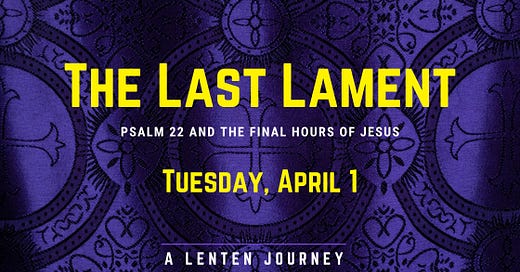“But you, O LORD, do not be far off! O you my help, come quickly to my aid! Deliver my soul from the sword, my precious life from the power of the dog! Save me from the mouth of the lion!”—Psalm 22:19–21a
It is a desperate prayer.
Not poetic. Not polite.
Just a cry for help.
“Come quickly to my aid.”
It is a desperate prayer. And it is the final prayer, the last lament. After today, prayer turns to praise; sadness gives way to celebration, and the Victim becomes the triumphant Victor.
Verses 19-21a is the groaning of someone cornered. Hunted. Dying. Jesus prays this from the Cross—not as a rhetorical flourish, but as a son pleading with His Father. There is urgency here. A deep need. And a dangerous enemy.
Did you notice the images lately? Bulls. Lions. Wild Dogs. They are animalistic—dogs, lions, wild oxen. They surround, snarl, and strike. But Jesus doesn’t fight back. He doesn’t curse or flee. He prays.
Bull charge. Wild dogs snap and growl. Lions rip and tear. And Jesus prays.
The Cup
There is a term Jesus used the day before today—on Thursday night in the Garden of Gethsemane. In the anguish of prayer, he pleaded with the Father, “If it be possible, let this cup pass from me” (Matthew 26:39).
This was not a casual metaphor. “The cup” is a powerful Old Testament image representing the wrath and judgment of God poured out upon sin. Prophets like Isaiah, Jeremiah, and Ezekiel1 spoke of it as the cup of God’s fury—one that nations would be forced to drink as a consequence of their rebellion.
In other words, Jesus knew what lay ahead. He was not just anticipating suffering and death; he was preparing to absorb the full measure of divine justice against sin.
On the cross, he would drink that cup to the dregs. He would take into himself the wrath we deserved—so that we might be given the cup of salvation instead (cf. Psalm 116:13).
So now, Jesus drinks.
He drinks what we deserved.
He swallows our judgment, our guilt, and our condemnation.
He feels the separation.
The silence.
The weight of sin not His own.
A Campfire Song
I hate to say this, but I didn’t understand the image of the cup, the wrath, and what Jesus did on the cross until I had been a Christian for more than a few years.
One summer, I led songs around a campfire for a church group. I had just learned a new one for the kids. I taught it to them in sections: first, the turn, then the first few lines, then the last lines, and then we sang it as a chorus.
Even still, I didn’t pay any attention to the words until that night. That night, I finally got it. I GOT IT. I understood what Jesus did for me.
These are the words:
He paid a debt he did not owe.
I owed a debt, I could not pay.
I needed someone to wash my sin away.
And now I sing a brand new song
Amazing Grace the whole day long.
Christ Church paid the debt that I could never pay.
The night at the fire when I sang that song and understood what it meant, my faith took a giant leap into maturity. I grew up that night. I stopped the music and asked all the kids to be quiet and to repeat the words to themselves, as a prayer—to deeply embrace their simple and profound meaning.
I don’t know if anyone did, but I did.
Keep reading with a 7-day free trial
Subscribe to The Anglican to keep reading this post and get 7 days of free access to the full post archives.





